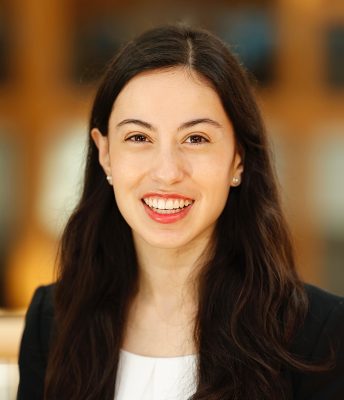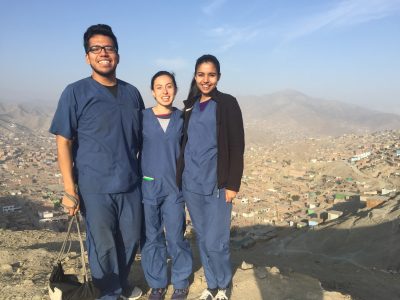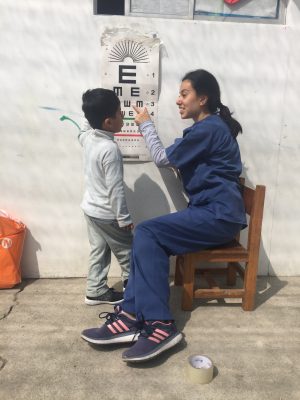Q&A with Mariana Lehoucq, MSPH Candidate in Health Policy & Management
What was your background before coming to Gillings?

MARIANA LEHOUCQ
Before Gillings, I worked in Institutional Research – essentially data analytics for colleges and universities. I enjoyed applying my statistics and data visualization backgrounds to questions in higher education policy, particularly for projects about equity, inclusion and support for students from marginalized backgrounds. I liked the puzzle-like nature of building datasets and selecting appropriate methodology, and was also drawn to the bigger questions of what outcome-data would ideally look like in an equitable world. These types of questions motivated me to choose a graduate program with in which I could study quantitative and qualitative methods, with an emphasis on equity.
My interest in public health started when I was in high school and started learning more about inequality in my mother’s hometown: Tarija, Bolivia. After going down a Wikipedia rabbit-hole, I ended up reading about anemia during pregnancy and childhood, specifically about its effects on development and later on student performance. Learning about how a consequence of poverty (malnutrition) could affect children’s experiences in school, and hamper potential social mobility that might have been obtained through education introduced me to the role of health in social justice.
While Amherst College did not have an official Public Health major, I leaned into my interest through taking classes such as Medical Anthropology, doing health-related summer internships, and pursuing a Certificate in Culture, Health, and Science alongside my Sociology major.
Will you tell us about your MSPH practicum?
This summer I worked at the Lancet Countdown, an organization that provides guidance to policymakers around the globe on combatting the health effects of climate change. As part of the Peru-based South America team, I analyzed the adaptation plans that South American countries committed to draft as part of the Cancun and Paris Agreements in 2010 and 2016. Specifically, we assessed each country’s plan on how comprehensively they identified their country’s vulnerabilities (i.e. increased infectious disease incidence, increased injuries, death, and/or displacement due to natural disasters, overload on healthcare systems, food insecurity, etc.) and how feasible their proposed solutions were.

Manchay, the community Mariana and fellow interns worked in during her 2017 internship
Having a Latin America- based practicum was particularly meaningful for me since my original interest in public health came from learning about health disparities and chronic conditions in my mother’s hometown in southern Bolivia. My interest in Latin American health was strengthened during a 2017 internship at a primary-care center in a low-income community on the outskirts of Lima, Peru. Working as health data collectors in preschools across Manchay, Lima, and assisting staff at a private, church-subsidized health center as well as a public, government run center helped me learn about health concerns in the local community, and see different approaches to making care and health information more accessible.
This summer’s practicum also helped me practice cross-cultural communication, and allowed me to become more comfortable in Spanish-speaking professional settings. Most of my internship colleagues live in Peru, so collaborating with them remotely gave me a new perspective on cross-cultural teams in a “post-pandemic” world.
What was your favorite course during your first year of the MSPH program?
My favorite class was Operations Research with Alyssa Mansfield. This course was my first exposure to the business side of public health, and analytic tools used for developing Business Intelligence. Her class taught me to use Excel in new ways, and equipped me with strategies to make decisions amongst uncertainty. My favorite part of the class was a real-world project in which we built a model to recommend staffing needs in conjunction with a team at UNC Health.
Could you tell us more about your global health interest focused on using quantitative and qualitative data to improve people’s lives?
Numbers are great at showing the scale and extent of a problem. Qualitative methods help us understand people’s experience more holistically and add details we may not have thought about by strictly looking at quantitative trends. As a former Sociology major, I feel strongly about using both approaches in Public Health. For example, statistics can help us understand the effectiveness of a public health intervention program on a specific outcome, but we also need to consider people’s perceptions of the program and its effects to determine if a program had an overall positive effect on a certain community.
What does “global health” mean to you?

Visiting a Manchay pre-school to support government data collection. Some children were scared of the eye-chart, so we let them come up to it and made it a fun game before having them read from the appropriate distance.
Global health took on a new meaning for me during the pandemic, as I began to see the health of different countries as more interconnected than I previously considered. I think there is also a huge need to have a global lens in healthcare when working domestically in the U.S., in order to appropriately serve our diverse population. To me this entails a focus on inclusion, cultural humility, and increased representation. It is imperative that the health workforce become more representative of the communities it serves, and becomes seen as a trusted source that communities can form partnerships with.
What drew you to the Gillings School of Global Public Health?
I grew up in North Carolina but did not realize until I was in college that I was lucky enough to have a leading school of public health in my home-state. Once I started learning more about the research and work experiences of Gillings faculty, I realized attending Gillings would be an amazing opportunity to learn more about public health and discover the types of careers available to people with public health interests.
I had heard of the close-knit community at Gillings, and I definitely agree that ever since I arrived I have felt very welcomed on campus!
What is your dream job?
There are many topics I would like to learn more about, so it can be a little difficult to describe a specific dream job. In the short run, I am interested in opportunities that allow me to continue learning about topics such as administration, workforce planning, pharmaceuticals, innovations in care-delivery and payment, environmental health, WASH, nutrition, or cost-effectiveness outcomes research. (I apologize for the long list – one of the things I love about the field of public health is how broad it is!)
In the long term, my dream is to work in a global/multilateral organization such as the UN or the WHO, and/or to start a non-profit that provides scholarships and mentorship to marginalized students pursuing health-related careers in Bolivia.
What sounds do you associate with summer?
The splashing of waves, the croaking of frogs, and the sound of opening my freezer in search of Ben & Jerries.
